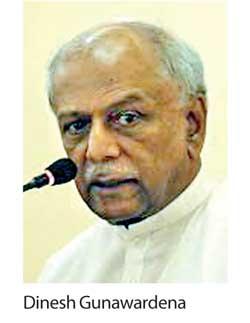12 Feb 2021 - {{hitsCtrl.values.hits}}
THE HINDU: Sri Lanka faced no pressure from China with regard to the East Container Terminal (ECT) project, Sri Lankan Foreign Minister Dinesh Gunawardena has said.
“China did not pressure us in anyway. They will not interfere in Sri Lanka’s internal affairs. Not only that, China will not interfere in Indo-Lanka relations. These are basic facts,” he told the local Tamil daily Virakesari in an interview published on Wednesday.

His remarks come amid reports — both in local and foreign media — that linked Colombo’s sudden decision to renege on a 2019 agreement with India and Japan, to jointly develop the terminal at the Colombo Port, to Chinese interests in the island nation. India’s Adani Group was to invest in the ECT. Adjoining the ECT, China holds 85% stakes in the Colombo International Container Terminal (CICT), which is under a 35-year ‘Build Operate and Transfer’ agreement with the Sri Lanka Port Authority (SLPA).
“The Indian High Commissioner expressed displeasure that we [Sri Lanka] had not conveyed the decision to them properly. He told me that India is not happy with our decision,” Gunawardena said.
A day after Sri Lanka pulled out of the tripartite agreement — amid prolonged agitations by port workers’ trade unions opposing a foreign role — Indian Envoy Gopal Baglay held three separate meetings with President Gotabaya Rajapaksa, Prime Minister Mahinda Rajapaksa and Gunawardena, The Hindu reported on February 2.
“I explained our [Sri Lanka’s] point of view to the High Commissioner, and appealed to India to view this keeping in mind the long-term relationship between the two countries,” Gunawardena said, expressing confidence that India would take a “broad view” of the matter, and “rightly understand” Colombo’s position. “This would not in any way damage the strong ties we have with India,” he added.
Following Sri Lanka’s February 1 Cabinet decision — India and Japan reportedly knew of the change only then — both countries expressed disappointment at Colombo’s “unilateral decision”.
Colombo had given a very different signal when External Affairs Minister S. Jaishankar visited in January. It was further validated by President Rajapaksa’s statement on January 13 telling port workers that the Adani Group would invest in the ECT, with the SLPA holding 51 percent stakes.
The Sri Lankan side has now said the West Container Terminal would be offered as an alternative, with 85 percent stakes for India and Japan. Neither country has commented on the offer that, sources said, was yet to be made directly.
Amid the apparent diplomatic strain, Prime Minister Rajapaksa told local presspersons that India is Sri Lanka’s “closest friend”. “We can resolve any issue through discussion,” he said. The Cabinet’s clearing of the revised ECT deal, dropping India and Japan, was not the first blow to New Delhi at the beginning of this year. Two weeks prior to that, Sri Lanka approved a Chinese energy project in three small islands off the Jaffna peninsula in the north, about 50 km off the Tamil Nadu coast.
20 Nov 2024 5 minute ago
20 Nov 2024 10 minute ago
20 Nov 2024 12 minute ago
20 Nov 2024 1 hours ago
20 Nov 2024 1 hours ago